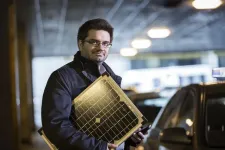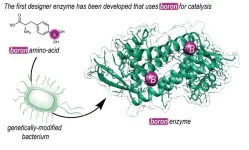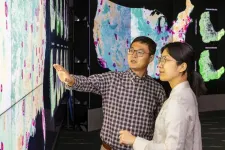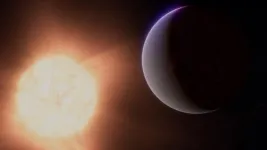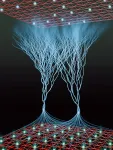(Press-News.org)
INRS professor recognized for international research and mentoring efforts in nanotechnology.
Federico Rosei, a professor at the Institut national de la recherche scientifique (INRS) in materials science and nanotechnology, has been appointed Materials Research Society (MRS) Fellow 2024 for “his leadership in the nanomaterials synthesis and characterization and his sustained international efforts in service, mentoring and outreach in the field.”
He thus becomes the first researcher in Quebec and the third across Canada to become a Fellow of this prestigious professional society in the field of advanced materials.
“I am honoured to become an MRS Fellow. This is an important recognition for scientists, like me, who work in the field of nanomaterials. I would like to dedicate this distinction to the young researchers who have worked in my team and contributed to the advancement of knowledge in the field.”
Federico Rosei, Professor at INRS and holder of UNESCO Chair in Materials and Technologies for Energy Conversion, Saving and Storage
A world-renowned researcher in the fields of nanoscience and nanotechnology, Federico Rosei has been recognized by the MRS for his work in characterizing nanomaterials, in particular multifunctional materials and their integration in optoelectronic devices.
The MRS is a leading interdisciplinary professional society in the field of advanced materials that “promotes communication for the advancement of interdisciplinary materials research and technology to improve the quality of life.” Founded in 1973, the Society has around 12,000 members from over 90 countries. Full members, or “Fellows,” are recognized for their “sustained and distinguished” contributions to advanced materials research and can serve as thought leaders to help guide and promote the development of the field.
International recognition of Canadian excellence
Professor Rosei is also one of 21 Canadian recipients of prestigious international research awards in 2023, according to the Global Excellence Initiative. In particular, he has distinguished himself through his interdisciplinary approach to promising work in nanotechnology.
Launched in 2012, the Global Excellence Initiative recognizes the contributions of Canadian researchers by identifying and supporting candidates for prestigious national and international awards. The researcher is the recipient of the only 2023 Guggenheim Fellowship in the engineering category. These Fellowships are awarded to mid-career individuals who have demonstrated exceptional research or artistic abilities, and who show great promise for the future.
His research on very small objects, which exhibit quantum effects that do not occur at the macro scale, could lead to new materials that support technological breakthroughs in energy, electronics and health.
“When you work at such small dimensions, the boundaries between disciplines are quite blurred,” explains Professor Rosei. “So what we do is considered physics, but also chemistry and materials science, and even engineering. That’s one of the fascinating aspects of my work: I get to collaborate with people from different backgrounds and exchange ideas and perspectives. This in turn brings about insights that would be difficult to obtain if we worked independently.”
Federico Rosei has just been named a Fellow of the Canadian Association of Physicists (CAP) in recognition of his outstanding achievements in the field of materials physics, in particular multiferroic materials and quantum dots, combined with exceptional mentoring of trainees. He is also recognized for his international leadership in promoting excellence in Canadian physics worldwide.
“We are proud to have Professor Rosei among us, an inspiring researcher for the INRS community. In addition to being a scientist of international renown for his achievements and leadership, he is also recognized for his remarkable contribution to training the next generation of scientists in Quebec and internationally. Here’s to the next generation of scientists in Quebec and around the world. Congratulations!
Isabelle Delisle, Interim Scientific Director, INRS
Professor Rosei is also the scientific head of the Nanofemtosecond Laboratory at INRS Energie Matériaux Télécommunications Research Centre. Holder of the Canada Research Chair in Nanostructured Materials from 2016 to 2023, the researcher boasts an international reputation, and the recognition of his peers has translated into numerous awards, honours and distinctions in several disciplines over the years, including chemistry, education, engineering and physics.
END
Federico Rosei: international recognition for a researcher at the forefront of his field
INRS Professor recognized for international research and mentoring efforts in nanotechnology
2024-05-08
ELSE PRESS RELEASES FROM THIS DATE:
University of Groningen chemists produce new-to-nature enzyme containing boron
2024-05-08
Boronic acid has been used in organic chemistry for decades, even though it is not present in any organism. ‘It gives rise to different chemical reactions than those we find in nature,’ explains Gerard Roelfes, Professor of Biomolecular Chemistry & Catalysis at the University of Groningen. His group created an enzyme with boronic acid at its reactive centre and then used directed evolution to make it more selective and to improve its catalytic power. Furthermore, enzymatic reactions are more sustainable than classical chemical reactions, as they take place at low temperatures and without toxic solvents. The study was presented online in the journal ...
Study led by ORNL informs climate resilience strategies in urban, rural areas
2024-05-08
Local decision-makers looking for ways to reduce the impact of heat waves on their communities have a valuable new capability at their disposal: a new study on vegetation resilience.
Scientists at the Department of Energy’s Oak Ridge National Laboratory completed a study of how well vegetation survived extreme heat events in both urban and rural communities across the country in recent years. The analysis informs pathways for climate mitigation, including ways to reduce the effect of urban heat islands.
Vegetation such as trees provide a valuable cooling effect, shading surfaces and deflecting solar radiation while releasing ...
Save the Date: American College of Surgeons Clinical Congress in San Francisco, October 19-22
2024-05-08
CHICAGO – The American College of Surgeons (ACS) Clinical Congress 2024 will take place Saturday, October 19, through Tuesday, October 22, in San Francisco and will feature opportunities for members of the media to learn about the latest evidence-based practices and research in surgery and healthcare.
This year’s Clinical Congress will once again be a hybrid event, allowing reporters to cover the conference onsite or virtually.
Clinical Congress is one of the world’s largest educational meetings for surgeons, ...
Gerry Rubin receives the 2024 Gruber Neuroscience Prize
2024-05-08
Janelia Senior Group Leader Gerry Rubin and Cori Bargmann of The Rockefeller University have been jointly awarded the 2024 Gruber Neuroscience Prize for their pioneering work in elucidating the organization of neural circuits in behavior and developing new genetic tools to advance the field of neuroscience.
The Gruber Neuroscience Prize, established in 2004, honors scientists for major discoveries that have advanced the understanding of the nervous system. The prize is part of the Gruber International Prize Program, hosted by the Gruber Foundation, which honors individuals in the fields of ...
Pore pressure diffusion led to microseismicity at Illinois basin carbon sequestration site
2024-05-08
Pore pressure diffusion generated by carbon dioxide injected underground at a carbon storage site in the Illinois Basin is the likely cause of hundreds of microearthquakes that took place at the site between 2011 and 2012, according to a new analysis.
The modeling study published in the Bulletin of the Seismological Society of America indicates that pressure diffusion along existing faults into the basement rock could have destabilized the faults where the microseismicity—ranging from Mw -2 to 1—occurred, said Ruben Juanes of MIT and colleagues.
There are some similarities between CO2 injection and wastewater injection from oil and gas operations, although globally the ...
New study finds AI-generated empathy has its limits
2024-05-08
ITHACA, N.Y. – Conversational agents (CAs) such as Alexa and Siri are designed to answer questions, offer suggestions – and even display empathy. However, new research finds they do poorly compared to humans when interpreting and exploring a user’s experience.
CAs are powered by large language models (LLMs) that ingest massive amounts of human-produced data, and thus can be prone to the same biases as the humans from which the information comes.
Researchers from Cornell University, Olin College and Stanford University tested this theory ...
NASA’s Webb hints at possible atmosphere surrounding rocky exoplanet
2024-05-08
Researchers using NASA’s James Webb Space Telescope may have detected atmospheric gases surrounding 55 Cancri e, a hot rocky exoplanet 41 light-years from Earth. This is the best evidence to date for the existence of any rocky planet atmosphere outside our solar system.
Renyu Hu from NASA’s Jet Propulsion Laboratory (JPL) in Pasadena, California, is lead author on a paper published today in Nature. “Webb is pushing the frontiers of exoplanet characterization to rocky planets,” Hu said. “It is truly ...
A tailored vaccine could one day treat eczema in children -- new research
2024-05-08
New research from a multi-disciplinary team at Trinity College Dublin suggests a “tailored vaccine” might hold the key to treating bacteria-driven flares of eczema in children.
The team has taken several leaps forward in understanding how the immune response works in cases of eczema driven by the common, troublesome Staphylococcus aureus bacterium, and in doing so they have identified new cellular targets for a vaccine.
Eczema, also known as atopic dermatitis, affects up to one in four children in Ireland. Common symptoms include itchy, dry skin, and – when bacteria are involved – weeping wounds that can ...
MD Anderson Research Highlights for May 8, 2024
2024-05-08
HOUSTON ― The University of Texas MD Anderson Cancer Center’s Research Highlights showcases the latest breakthroughs in cancer care, research and prevention. These advances are made possible through seamless collaboration between MD Anderson’s world-leading clinicians and scientists, bringing discoveries from the lab to the clinic and back.
Recent developments at MD Anderson offer insights into expanding the use of FGFR inhibitors, maintaining radiation therapy as standard of care for locally recurrent endometrial cancer, an antibody-drug ...
The interference of many atoms, and a new approach to boson sampling
2024-05-08
In daily life, when two objects are “indistinguishable,” it’s due to an imperfect state of knowledge. As a street magician scrambles the cups and balls, you could, in principle, keep track of which ball is which as they are passed between the cups. However, at the smallest scales in nature, even the magician cannot tell one ball from another. True indistinguishability of this type can fundamentally alter how the balls behave.
For example, in a classic experiment by Hong, Ou and Mandel, two identical photons (balls) striking opposite sides of a half-reflective mirror are always ...
LAST 30 PRESS RELEASES:
Machine learning reveals Raman signatures of liquid-like ion conduction in solid electrolytes
Children’s Hospital of Philadelphia researchers emphasize benefits and risks of generative AI at different stages of childhood development
Why conversation is more like a dance than an exchange of words
With Evo 2, AI can model and design the genetic code for all domains of life
Discovery of why only some early tumors survive could help catch and treat cancer at very earliest stages
Study reveals how gut bacteria and diet can reprogram fat to burn more energy
Mayo Clinic researchers link Parkinson's-related protein to faster Alzheimer's progression in women
Trends in metabolic and bariatric surgery use during the GLP-1 receptor agonist era
Loneliness, anxiety symptoms, depressive symptoms, and suicidal ideation in the all of us dataset
A decision-support system to personalize antidepressant treatment in major depressive disorder
Thunderstorms don’t just appear out of thin air - scientists' key finding to improve forecasting
Automated CT scan analysis could fast-track clinical assessments
New UNC Charlotte study reveals how just three molecules can launch gene-silencing condensates, organizing the epigenome and controlling stem cell differentiation
Oldest known bony fish fossils uncover early vertebrate evolution
High‑performance all‑solid‑state magnesium-air rechargeable battery enabled by metal-free nanoporous graphene
Improving data science education using interest‑matched examples and hands‑on data exercises
Sparkling water helps keep minds sharp during long esports sessions
Drone LiDAR surveys of abandoned roads reveal long-term debris supply driving debris-flow hazards
UGA Bioinformatics doctoral student selected for AIBS and SURA public policy fellowship
Gut microbiome connected with heart disease precursor
Nitrous oxide, a product of fertilizer use, may harm some soil bacteria
FAU lands $4.5M US Air Force T-1A Jayhawk flight simulator
SimTac: A physics-based simulator for vision-based tactile sensing with biomorphic structures
Preparing students to deal with ‘reality shock’ in the workplace
Researchers develop beating, 3D-printed heart model for surgical practice
Black soldier fly larvae show promise for safe organic waste removal
People with COPD commonly misuse medications
How periodontitis-linked bacteria accelerate osteoporosis-like bone loss through the gut
Understanding how cells take up and use isolated ‘powerhouses’ to restore energy function
Ten-point plan to deliver climate education unveiled by experts
[Press-News.org] Federico Rosei: international recognition for a researcher at the forefront of his fieldINRS Professor recognized for international research and mentoring efforts in nanotechnology
